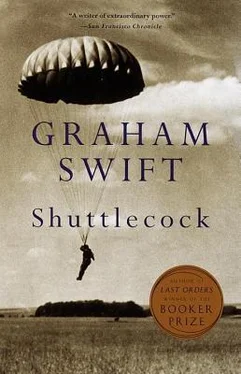Dad is in Caen. Caen — ‘that testing ground of the future allied advance’. It is six weeks before D-day. He is collecting information on troop movements, supply shipments and on the defences of Caen itself, all of which may be of vital importance in the forthcoming invasion. There is a factory in the town which has been turned over to the production of spare parts for divisions on the coast. The details and timing of shipments from the factory have to be known so that effective sabotage can be carried out. This information can only be obtained by gaining access to the supply schedules of the divisions themselves, or more feasibly — but no less hazardously — by secretly examining documents in the office of the factory supervisor.
… I myself volunteered to carry out this task. I knew the lay-out of the factory as well as the others, and the risk was not as great as for Jules and Émile who, after all, would have to stay in Caen and did not have an intelligence network to ferry them out of the area. I learnt how to crack a safe of the type in the patron ’s office from an old Lyonnais called Maurice, who had been a petty crook in his younger days but was now putting his criminal expertise to patriotic use.
We were fortunate in that the factory was an old, rambling building, slackly guarded, and that the managerial offices, empty at night, occupied an annexe away from the factory itself, across a yard, and abutting other assorted, mostly disused buildings not belonging to the factory complex. They could be approached independently by a roof-top route. The Germans had foolishly expended most of their resources for guarding the factory — sentries, dogs, searchlights — on the factory itself and little on the offices — though it was here that, in the long term, most damage could be done.
Gaining access to the office was to prove a relatively easy part of the operation; but the circumstances of the roof-top route were such that, though an excellent means of approach, it would make an arduous and risky exit. In order to escape from the factory I would have to descend from the office by a back staircase, cross part of the factory yard and scale a section of the rear factory wall where it turned a convenient corner screening me from the main area of the yard and, so I hoped, the sentries. I was provided with a rope. Jules and Émile were to be waiting, in hiding, near the other side of the wall. When they saw the rope flung over, they were to use it to haul me up the inner side of the wall and, reaching the top, I was to descend on the other side by the simple means of jumping into a sort of cradle formed by their arms — not the most reliable method, but a quick one and one we had practised several times before.
Success rested on the reported laxity of the guards, and a good measure of luck. These were urgent days, when there was no time for delay or finesse. We could no longer rely on the R A F to ease our work — they were now reluctant to concentrate raids in Normandy for fear of giving away future invasion sites. Every opportunity we failed to take through too much caution might take its toll on the effectiveness of that future invasion.
The night we chose was that of May 2nd. A warm night; patchy clouds; a faint moon. I parted from my comrades and slipped, some minutes later, into the narrow streets which led to my roof-top route. I carried the rope, coiled tightly round my waist, a plan of the factory in my head, and a knife. I remember that as I made my way I had the strange sensation of being no more than an ordinary burglar. My forebodings about what lay ahead were curiously like those of a civilian lawbreaker — as if I feared discovery by the police rather than the enemy. I have sometimes wondered whether this was a feeling peculiar to the undercover agent — without his absolving uniform — the feeling of being less a spy than a criminal. In his role, war and peace-time get confused. Do civilized instincts persist in war, or does civilized life veil the instincts of war? I cannot say. On that May night I had little time for philosophizing.…
And it’s that last passage, along with barely a handful of others like it, which, lately, I’ve been reading and rereading and which I’ve marked already, in both copies, in pencil. Those rare betrayals of feeling; those rare moments of self-scrutiny, of speculation. All so quickly dismissed. ‘I cannot say.’ I stare at the page. I read the words as though, if I read hard enough, other words will appear: Dad will begin to speak.
I glance at my watch. Five to three. People strolling along the river path at Richmond. The first decent Saturday of the year. Marian; and the kids. On the river, passing pleasure boats and launches. A swan, with a bevy of fraught cygnets, riding the wash.
… things had gone so well up to this point that I almost anticipated trouble in the later stages. I descended the rear fire-escape stairs from the corridor adjoining the patron ’s office. This brought me out into a cobbled passage-way, between two office blocks, one end blind and the other opening out on to the part of the yard I had to cross — or rather skirt, keeping to whatever shadow I could find. My position was now essentially that of the escaper from a walled prison. I had transferred my coil of rope to my shoulder, in readiness in case things came to a quick dash.
I started forward along the passage-way. I had gone a few paces and was a short distance from the yard when a sentry appeared in the opening, halted, in a stooping, unsoldierly fashion and stood with his back towards me. How he failed to see me, I don’t know. As he turned, he must have looked, even if inadvertently, down the passage-way, and I would not have said that, at that range, the shadows were enough to hide me. I could only freeze, my heart pounding, against the wall. The sentry tugged at his rifle sling, easing it on his shoulder, and then his hands seemed to be busy at his pockets: the unmistakable actions of a man preparing to light a cigarette. It was likely he would choose the concealment of the passage-way in which to smoke: five minutes on tenterhooks.
Experience had taught me that where there is a choice between several possibilities which cannot be calculated exactly, and cold steel, then cold steel is the better choice. At all events, decision is better than hesitation. The sentry might smoke his cigarette and move on, and I might wait for him — though I would still have his presence to contend with. On the other hand, he might turn his head at any moment. If I silenced him, and even if I eventually got out of the factory successfully, our break-in would naturally be discovered, and the Germans, if they had any sense, would switch the schedules of their shipments. But then again, since everything in the office had been left as I found it, there was just a chance they would take the death of the sentry to mean a sabotage attempt on the factory itself, search the premises for explosives, and overlook the information in the patron ’s office. Better this chance than my capture and outright failure.
All this must have passed through my brain in seconds. But a simple fact tipped the scales in favour of cold steel. The German was standing, reaching for his cigarette, not inside the passage-way, but just beyond its entrance, in view of the yard. This meant that he must himself be unobserved and that he was presumably confident he would remain so for the length of time it took him to enjoy his illicit cigarette. If I acted at once I could take advantage of the safety he himself had indicated to me.
The stiletto I had acquired at Tarbes was in its sheath inside my trousers against my hip. It could be drawn almost noiselessly, but I took the precaution of waiting for a masking sound — the German striking his match. The match flared. I drew the stiletto. The German’s head bent into his cupped hands, the flame lighting up his helmet and a thin strip of neck above his collar. I moved a step or two forward along the wall. I knew that if the Germans found a dead guard they would take reprisals, and, for want of anyone else, they might shoot one or two of the innocent factory workers. But I could already hear Jules’ and Émile’s laconic response. ‘ N’importe ’ — my friends would spit — ‘they shouldn’t make parts for the Bodies.’
Читать дальше












